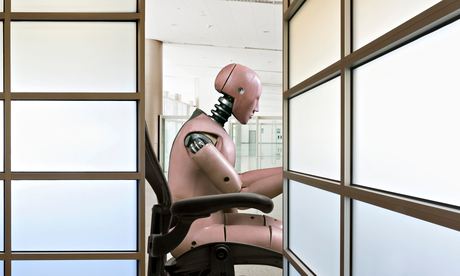
Not often do you hear a Newsnight presenter using an arcane mathematical term, but last week was an exception. The culprit was David Grossman, who made an excellent film for Newsnight about the threat to employment from advanced robotics. In the course of this, he made the standard pilgrimage to MIT to interview Erik Brynjolfsson and Andrew McAfee, who have made much of the running in this area with a number of books, of which the most recent is The Second Machine Age. Their argument, said Grossman, was that our society has reached an "inflection point", a concept beloved of those who studied differential calculus in their youth, but probably unfamiliar to the average viewer.
Still, that's what Wikipedia is for. A point of inflection, it explains, is a point on a curve at which the curvature or concavity changes sign from plus to minus (or vice versa). Since this sounds like a smaller deal than the wholesale upheaval prophesied by Brynjolfsson and McAfee, Grossman might have got more mileage out of "tipping point", which, though different to inflection, seems to me to get closer to the nub of the question.
In their book, Brynjolfsson and McAfee maintain that the combination of massive computing power, comprehensive networking, machine learning, digital mapping and the "internet of things" are bringing about a full-blown industrial revolution on the same scale as the transformations brought about by steam power and electricity. But whereas those earlier revolutions supplanted human (and horse) muscle, the new one will supplant much human cognition, in that work that involved employing people to do information-processing tasks will ultimately be done by computers. The implication is that even those in many white-collar occupations may find themselves unemployable.
At this point, many readers will yawn knowingly. We have, after all, heard this kind of heady talk before – in the 1960s, for example, when robots arrived on automobile assembly lines and there were dire predictions about mass unemployment caused by these new machines. It didn't happen, or at any rate it didn't happen as advertised. Many assembly-line jobs did disappear, but new kinds of enterprise appeared, and displaced workers found new employment and the prosperity machine rolled on. So are Grossman and his MIT interlocutors just winding us up?
Not so, they insist. The problem, they say, is that most people have no idea of the abilities of these new technologies. They point to the Google self-driving car as an example of a capability that – until recently – most people thought would be the exclusive preserve of human beings for a long time to come. Yet the cars now exist and are safer than human-controlled vehicles. And if computers can safely drive cars in crowded urban environments, they can certainly do a lot of the tasks currently performed by office workers. This time, in other words, is different. We really are standing on the brink of an inflection point.
There is a whiff of technological determinism to all this (although Brynjolfsson and McAfee vigorously deny the charge). It suggests that technology is the main – if not the only – force that drives history. In a variation on the "guns don't kill people – people do" argument, critics point out that the social context in which technologies come into being, not technology itself, is the thing that determines change.
And that's true. But, paradoxically, this time it may provide an argument that supports the determinist thrust of the Brynjolfsson/McAfee case. Because these new technologies have arrived at a time when the social context – neoliberal capitalism – seems purpose-built for furthering the extreme rationalisation of work that the new technologies enable. Do we seriously believe that an economic system that supports the massive outsourcing of jobs to low-wage countries would not jump at the opportunity of replacing expensive white-collar employees with robots that cost about $4 an hour to run, never answer back, don't have unions and are never sick or depressed?
Then there is one other thing that Brynjolfsson and McAfee don't really discuss, namely the four intrinsic properties of computing and networking technologies. They are: near-zero marginal costs (which confer massive advantages on early movers and investors); network effects (which lead to winner-takes-all outcomes, as has happened with search and social networking); the way in which online phenomena follow power law statistical distributions that apply when a few players capture the overwhelming bulk of the action, leaving everyone else scrabbling around in a "long tail"; and technical lock-in (of the kind that has enabled Amazon to exert an iron grip on cloud computing).
Put these together and you have technologies that have an in-built tendency towards monopolistic power. They are shaping the world into which we are heading. The inflection point of which David Grossman spoke might actually be the edge of a precipice.

